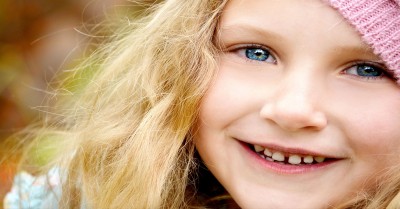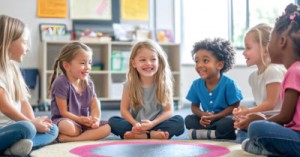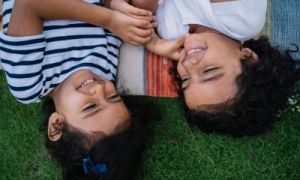Holistic learning gives as much importance to the emotional, social and physical growth of the child as the intellectual. Among the many benefits of holistic learning is that it enhances a child's subjective sense of well-being or simply put, makes them happier. The following article provides information on Nurturing Emotional Learning, Fostering Social Skills, Facilitiatiing Physical Movement and more.
Nurtures Emotional Learning
An integral part of learning outcomes in holistic education is emotional well-being. Learning programmes and experiences are designed in ways that allow children ample opportunities to develop their emotional intelligence. They learn ways to identify feelings both in themselves and others. They are taught skills that help them in emotional regulation like slow, ‘belly breathing’ when feeling anxious or taking a ‘time out when they are extremely ‘mad’ at someone. Best of all, children learn that it is OK not to feel happy all the time and most importantly, in case they are upset, they can reach out to trusted adults for help. All these skills help children feel in more control of their inner selves and equip them with the resources to work towards their own well-being.
Fosters Social Skills
An essential aspect of holistic education is using more collaboration in learning tasks and activities. As children participate in group play, pair activities, buddy walk, and circle time, they develop social skills like sharing, negotiation, turn-taking, planning and problem-solving. Also through parallel play, associate play and cooperative play, children learn from each other. All these experiences strengthen children’s sense of belonging in peer and social groups, thus making for a strong sense of well-being.
Facilitates Physical Movement
The most obvious way that holistic education differs from traditional bookish education is by prioritising physical movement and exercise. "Feel-good" chemicals in the brain, known as endorphins, are released by the brain during physical activity and help to improve mood, energy levels and even sleep1. Also, exercise can help reduce symptoms of anxiety and encourage children to participate in team sports, lowering social anxiety too. Additionally, regular physical activity promotes healthy body weight, positive body image and self-esteem – all of which help children feel happy about themselves.
Helps Children Have Fun While Learning
Since holistic education adopts organic and emergent approaches, it uses children’s own interests, play and multi-sensory approaches to design learning practices. Also, such educational models take into account individual learning styles, and individual learning paces and facilitate supporting environments. All these measures, not only promote learning but help children to have fun while doing it.
Finally, by involving the family and wider community, holistic approaches go a long way in reducing inequities. This in turn has the potential to reduce the psychological impact of issues such as violence, abuse, or poverty on academic achievement2. When children feel safe in a secure and nurturing environment, they live, love and learn happily.
References:
Holistic Education, About Children's Health
What is Holistic Education, American University Orlando







 As an Educator in Australia, your pay rate falls under the Children’s Services Award 2010. This award states the minimum amount that an employer can
As an Educator in Australia, your pay rate falls under the Children’s Services Award 2010. This award states the minimum amount that an employer can When working as a qualified Early Childhood Teacher (with a university degree) within a service, your rate of pay will come from the Educational Services
When working as a qualified Early Childhood Teacher (with a university degree) within a service, your rate of pay will come from the Educational Services When working as a Diploma Qualified Educator your pay rate is from the Children's Services Award 2010. This Award states your minimum rate of pay
When working as a Diploma Qualified Educator your pay rate is from the Children's Services Award 2010. This Award states your minimum rate of pay When working as a Cert 3 Qualified Educator, your pay rate is from the Children's Services Award 2010. This Award states your minimum rate of
When working as a Cert 3 Qualified Educator, your pay rate is from the Children's Services Award 2010. This Award states your minimum rate of Educational Leaders play a crucial role in their early childhood service by ensuring that the educational program aligns with best practices and supports the holistic
Educational Leaders play a crucial role in their early childhood service by ensuring that the educational program aligns with best practices and supports the holistic In early childhood education and care, ratios are more than a technicality—they are a frontline safeguard. Every child deserves responsive supervision, emotional connection, and developmental
In early childhood education and care, ratios are more than a technicality—they are a frontline safeguard. Every child deserves responsive supervision, emotional connection, and developmental Here’s a comprehensive Mobile Phone and Smart Watch Policy tailored for early childhood education and care (ECEC) services in Australia, aligned with the latest 2025
Here’s a comprehensive Mobile Phone and Smart Watch Policy tailored for early childhood education and care (ECEC) services in Australia, aligned with the latest 2025 With the new national child safety reforms kicking in on 1 September 2025, early childhood services like yours have a real opportunity to lead the
With the new national child safety reforms kicking in on 1 September 2025, early childhood services like yours have a real opportunity to lead the The Sea of Fish Challenge is a national initiative that invites children, educators, families, and communities to create and display fish artworks as a symbol
The Sea of Fish Challenge is a national initiative that invites children, educators, families, and communities to create and display fish artworks as a symbol Across the early childhood education and care sector, educators are sounding the alarm: current staffing ratios are insufficient to deliver safe, meaningful, and developmentally appropriate
Across the early childhood education and care sector, educators are sounding the alarm: current staffing ratios are insufficient to deliver safe, meaningful, and developmentally appropriate


